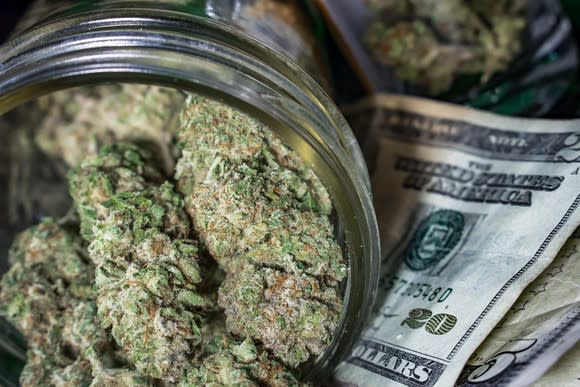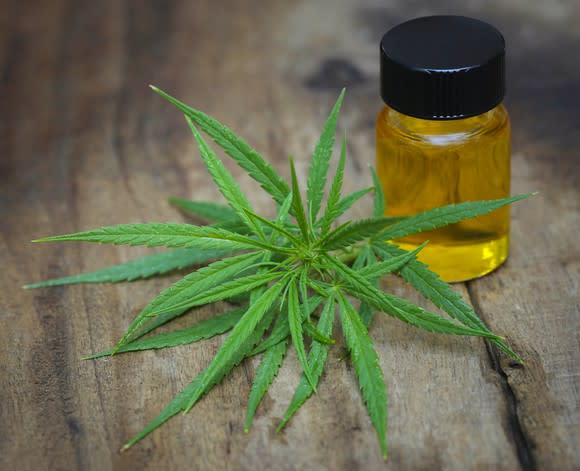Invest in Marijuana? 20 Questions You'll Want to Know the Answers to First
Marijuana stocks have been practically unstoppable over the past couple of years, and they're certainly attracting their fair share of investors. A majority of pot stocks with a market cap in excess of $200 million have seen their share prices jump by 100%, 200%, or perhaps even more over the trailing one-year period.
Yet, investing in marijuana is no guarantee of success. Opportunities do exist, but there are also plenty of risks. If you're planning to get it on the green rush, you'll first want to know the answers to some very critical questions. Whether you're new to investing or a seasoned veteran, these 20 questions concerning marijuana stocks are for you.

Image source: Getty Images.
1. What's the potential for marijuana stocks?
Though it'll depend on your source, most analysts expect the marijuana industry to grow by 23% to 35% annually over the next five years. Cannabis research firm ArcView believes a compound annual growth rate of 26% will lead to nearly $22 billion in legal North American weed sales by 2021, while Cowen & Co. is looking for $50 billion in U.S. sales alone by 2026.
2. Does the public support legalizing marijuana?
In the U.S., according to both Gallup's and CBS News' latest polls, the public is very much in support of legalizing recreational marijuana. In April, CBS News found that 61% of respondents were in favor of national legalization, while Gallup's October 2017 survey found 64% support for the idea. A separate survey from the independent Quinnipiac University in April 2017 found 94% favorability toward legalizing medical cannabis compared to just 5% who opposed the idea.
3. Does anyone not support the legalization of marijuana?
Yes. Though most surveys don't break down the specifics of their data, Gallup has found that a small majority of senior citizens aged 55 and up still favor keeping marijuana illegal. It is worth mentioning, however, that favorability toward pot among seniors has improved in recent years, meaning this last major opponent may soon have a net positive view on pot.

Image source: Getty Images.
4. Is it legal anywhere?
Yes. Uruguay is the only country in the world right now where recreational and medical marijuana is completely legal. Beyond that, there are around a dozen countries that offer some degree of legal medicinal use. Our neighbors to the north, Canada, legalized medical marijuana back in 2001, and they might become the first developed country to legalize adult-use weed by July 2018. Cannabis is wholly illegal in the U.S., where it's a Schedule I drug, putting it on par with heroin and LSD.
5. How many states is weed "legal" in the U.S.?
Despite being illegal federally, 29 U.S. states (and the District of Columbia) have passed laws allowing physicians to prescribe medical cannabis since 1996. Furthermore, residents in eight states (and the District of Columbia) since 2012 have passed propositions legalizing the sale of recreational weed.
6. Can it be exported?
Yes, but not from the United States. A small handful of growers in Canada, including Canopy Growth Corp. (NASDAQOTH: TWMJF), Aurora Cannabis (NASDAQOTH: ACBFF), and Aphria (NASDAQOTH: APHQF), have been given the green light to export dried cannabis to foreign markets, like Germany, which have legalized medical weed and have only minimal domestic growing capacity.

Image source: GW Pharmaceuticals.
7. How is medical cannabis research handled in the U.S.?
Since marijuana is illegal at the federal level, researching cannabis' benefits and risks is difficult due to legislative red tape. The University of Mississippi has the only federally approved grow farm for researching cannabis in the entire country, making it hard for researchers to make much headway.
8. Is there evidence that medical marijuana is helpful to patients?
Yes and no. Yes, there have been clinical studies demonstrating the positive effects of medical marijuana or its cannabinoids for the patient. For example, GW Pharmaceuticals' (NASDAQ: GWPH) lead drug, Epidiolex, demonstrated a statistically significant reduction in seizure frequency in multiple pivotal-stage trials in patients with two rare forms of childhood-onset epilepsy (Dravet syndrome and Lennox-Gastaut syndrome). At the same time, GW Pharmaceuticals' Sativex, an oral cannabinoid-based spray approved in the EU, failed miserably in a U.S. cancer pain study. Thus, it appears it can help for certain ailments, but it's not a cure-all for patients.
9. Why doesn't the U.S. government want to legalize marijuana?
This is a complex question with no definitive answer. Rather, it involves a confluence of factors. Right now, Republicans are simply too tied up with tax reform and healthcare reform to give marijuana reform the time of day. The GOP also has a less favorable view of pot than Democrats, so they're less likely to bring reform legislation to the table. Lastly, lawmakers don't believe there's enough known about the benefits-versus-risk profile of cannabis, which sways them to stand pat on its current scheduling.

Image source: Getty Images.
10. So, what's protecting state-level cannabis businesses right now?
U.S. pot businesses are currently being protected by the Cole Memo and the Rohrabacher-Farr Amendment. In simple terms, the Cole Memo, named after former Deputy Attorney General James Cole, outlines a series of "rules" states have to follow in exchange for the federal government taking a hands-off approach. These rules include keeping pot out of the hands of minors, and ensuring that weed doesn't leave a state's borders. The Rohrabacher-Farr Amendment, which has to be approved each year, ensures that medical weed businesses can't face federal prosecution for operating in one of the 29 legal states.
11. Could Attorney General Jeff Sessions really kill the U.S. pot industry?
The short answer is yes, but it'd be tough for him to gut the industry. Current Attorney General Jeff Sessions absolutely despises marijuana's domestic expansion and has gone as far as to send a letter to a few of his colleagues requesting the repeal of the Rohrabacher-Farr Amendment. Without this amendment in place, Sessions could have a field day. He is a major obstacle to the industry.
12. Are there tax implications for U.S. pot businesses?
Yes. Since marijuana is an illegal drug, U.S. tax code 280E disallows businesses that sell a federally illegal substance from taking normal corporate income-tax deductions. This means profitable pot businesses are paying tax on their gross profits instead of net profits, leaving them with less to reinvest and hire than a "normal" business.

Image source: Getty Images.
13. Do U.S. weed companies face other financial constraints?
Also yes. Most marijuana companies are cash-only businesses since banks often want nothing to do with them. Basic financial services, even including a checking account, may be off-limits because financial institutions report to the Federal Deposit Insurance Corporation, a federally created entity. If the federal government were to crack down on the weed industry in the future, banks that assist marijuana companies with checking accounts and loans could be criminally charged and/or fined.
14. What other unknowns are holding the industry back?
There are also concerns about what might happen to adolescent access if marijuana were legalized. It's presumed that legalization would involve a home-grow option, which would in turn give adolescents easy access to weed. Some clinical studies have shown negative impacts to long-term memory for the developing adolescent mind, so this is a clear concern.
Additionally, lawmakers are worried about regulating drivers who use cannabis. Unlike alcohol, which has clear tests for impairment, there are no guidelines for cannabis use. And unlike alcohol, THC from cannabis can stay in a user's system for days or weeks. That makes testing for use and impairment all the more difficult.
15. Are any marijuana stocks making money?
Yes, a few actually are. For fiscal 2017, both Aphria and MedReleaf (NASDAQOTH: MEDFF) reported full-year profits. In terms of their most recent quarterly reports, just Aurora Cannabis and Aphria delivered a profit. Considering the reinvestment ongoing in the industry right now, most pot stocks are losing money.

Image source: Getty Images.
16. What pot products offer the highest margins?
Despite what you might believe, dried cannabis and edibles offer rather pedestrian margins. Due to changing consumer habits and growing demand, reinvestment is currently gobbling up a lot of this margin. Instead, cannabis oils tend to have some of the highest margins in the industry. MedReleaf, which tends to target a more affluent medical clientele in Canada, possesses a large chunk of its domestic cannabis oils market.
17. How are pot stocks funding their businesses?
Since most marijuana stocks aren't profitable, and most have little or no access to traditional banking, common stock offerings in the U.S. and bought-deal offerings in Canada, along with convertible debt issuances, have been the primary means of raising capital. The good news is there's a lot of excitement surrounding marijuana stocks at present, meaning there have plenty of investors to buy these shares. Unfortunately, it also means dilution galore for existing shareholders.
18. Are marijuana stocks listed on major exchanges?
Although a few are, like GW Pharmaceuticals, most aren't. A majority of marijuana stocks are either listed on the over-the-counter (OTC) exchanges and/or are penny stocks. The OTC exchanges have made strides in improving listing standards in recent years, but getting up-to-date financial information on listed companies can still be a struggle at times.

Image source: Getty Images.
19. Are there any marijuana ETFs?
Yes. The Horizons Marijuana Life Sciences ETF (TSX: HMMJ) became the very first marijuana ETF ever when it debuted on the Toronto Stock Exchange earlier this year. It currently has a stake in 21 different marijuana companies, including the aforementioned GW Pharmaceuticals, Aurora Cannabis, Canopy Growth, MedReleaf, and Aphria.
Recently, ETF Managers Group announced that it would soon be shifting the focus of its Tierra XP Latin American Real Estate ETF (NYSEMKT: LARE) away from Latin American real estate and to a cannabis tracking index. The rebranded ETF will be known as the Alternative Agroscience ETF, and it's expected to take on its new focus as of Dec. 26, 2017. In less than a month, U.S. investors can buy a marijuana ETF of their very own.
20. Is the black market a concern?
Very much so. Despite $6.9 billion in legal sales in North America in 2016, ArcView estimates that $46.4 billion were conducted on the black market. Tax revenue from legal weed is expected to help bolster federal and/or state budgets, but if tax rates are too high, it could drive consumers from legal channels to the black market, which has minimal overhead costs.
The only question left to be answered is this: Is the green rush right for you?
More From The Motley Fool
6 Years Later, 6 Charts That Show How Far Apple, Inc. Has Come Since Steve Jobs' Passing
Why You're Smart to Buy Shopify Inc. (US) -- Despite Citron's Report
Sean Williams has no position in any of the stocks mentioned. The Motley Fool has no position in any of the stocks mentioned. The Motley Fool has a disclosure policy.

 Yahoo Finance
Yahoo Finance 